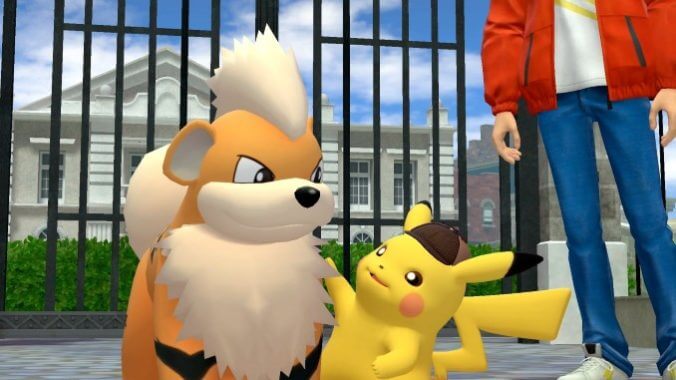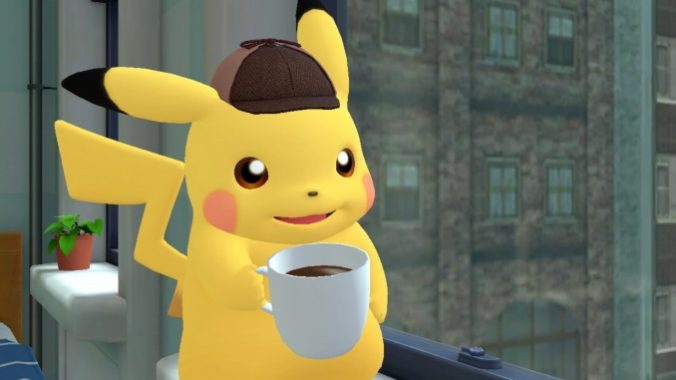I love mysteries. My favorite novel is Agatha Christie’s And Then There Were None, and I binged Criminal Minds in high school because I liked solving cases before the show’s characters did and it made me feel smarter than fictional FBI agents (I am not smarter than FBI agents; storytelling is just designed to hold your hand and show you what to think). I like mysteries for the thrill. I like the desperate search for answers within the unending puzzle of human nature. So I was excited to pick up Detective Pikachu Returns—an interactive mystery game the likes of which I haven’t played in years, and the second installment in the series that inspired the Detective Pikachu movie that I have yet to finish. Regrettably, the only thrill I felt while playing Detective Pikachu Returns was the thrill of rage.
Released earlier this month, Detective Pikachu Returns is the sequel to 2016’s Detective Pikachu. You continue to play as detective Tim Goodman and his partner Pikachu to solve mysteries, chief of which are why Tim and Pikachu can speak to one another, and where Tim’s father, Harry Goodman, is. Once again set in Ryme City, you’ll help Tim and Pikachu with a series of cases that inch you closer and closer to unveiling Harry’s whereabouts, and to answering questions posed by the first game.
Okay, not that we’ve got that out of the way, let’s start with the basics. The game’s look? Cute! The Pokémon are, as ever, smooth and huggable, most characters look generic and polished, and settings are rendered well enough as a 3D side scroller devoid of distracting detail. Pikachu’s detective hat looks great, as does Slowpoke’s fedora. That’s about it—as soon as I booted up Detective Pikachu Returns, I was struck by how the animation and design feels relatively low quality—that is to say, outdated. For a moment I questioned whether I was playing a new game or a remaster of an older one. I think the issue is that I’m used to more modern, polished, intricate looking games as opposed to Detective Pikachu Returns’s almost old school, basic, cartoonish look. Upon review it seems that the Pokémon style is classically smooth and low poly, but as someone who isn’t too intimate with one of the world’s largest videogame franchises, I guess I just expected more.
I felt similarly about controls and mechanics because, again, there’s not much either way. As far as I can tell, you’ll mostly be hammering the A button in a fruitlessly desperate bid to speed through conversations and toggling the joystick to run around Ryme City. There’s a handful of other controls you’ll need—R to trace scents with Growlithe, X to access your deducing journal—but beyond that you won’t be taking much advantage of those Joycons. Which, to be fair, you could say doesn’t hinder gameplay too much. Personally, when controls are complicated and involved, I get very easily confused and spend more time trying to remember what the D-pad does than actually using it. With Detective Pikachu Returns, at least I’m just spending more time trying to remember what the game is about.

The mechanics are equally simple. You can explore Ryme City, interview people and Pokémon to collect evidence, inspect crime scenes, use your deducing journal with Pikachu’s help, and go on dreaded side quests that distract from already lengthy mainline missions. My favorite, and most patronizing, of these is probably the journal. Whenever you open it, Pikachu announces, in his gravelly old man voice, “Okay! Let’s start deducing!” Here’s where all the evidence you collect goes, organized and filed neatly for the player to make conclusions about the crimes you investigate, and for Pikachu to chide you if you answer wrong. It’s one of the parts of Detective Pikachu Returns that feels like actual detective work and actual collaboration between player and character, and easily the part that expends the most brain power.
That is to say, this game is boring. I rarely find myself being so blunt in an opinion—generally I try to leave room for nuance, for interpretation and creative liberty, but Detective Pikachu Returns is an unfortunately, exhaustingly boring videogame. I found myself more frustrated with its pace and lack of actual play than I found myself enjoying any other element. I would go so far as to say that, rather than videogame, Detective Pikachu Returns is a visual novel that you as the player occasionally get to interact; I have no qualms with the visual novel, but I didn’t go into this game expecting it to be that. I came in expecting something engaging and immersive, and came away severely disappointed because I didn’t feel that I was an active participant in the game or with the characters. Rather I felt sidelined, my ego bruised, by wanting to play a game and instead getting talked at for several hours.
For one, there are too many steps. It should not have taken me approximately four hours of play time to solve an introductory mystery. Every time I thought I was nearing the big reveal, the game gave me another piece of time consuming evidence to go investigate, collect, deduce, and bring back to the crime scene. Which, to Detective Pikachu Returns’s credit, is probably reflective of actual detective work, but in that case they might’ve made the mysteries more complicated to solve. I had the first mystery solved within two clues, but then I had to schlep through eight more just to satisfy the game. I was able to propose solutions to small problems along the way, but couldn’t solve the whole mystery at once even if I knew the answer. At that point I’d prefer a gaudy twist over being alone in my room and yelling at Pikachu to shut up so I can collect whatever evidence he wants me to see.
My anger, however, does indicate that I might not be the target audience for Detective Pikachu Returns. It might be better suited to a child if there weren’t so much reading. I don’t know much about kids because I’ve never had any, but I would confidently say that there’s too much dialogue for a 7-year-old to keep up with, but also too much to retain a 12-year-old’s attention. And you can’t speed through any of it. The cute design, globally familiar characters, and fairly simple mysteries would be good for kids, but I just can’t get past the game’s simultaneous over and under involvement, and its snail pace.
But don’t let me be a downer. Here’s the good: Detective Pikachu Returns does not require much from you. It won’t ask you to do anything especially complicated and you get to look at cute Pokémon. It won’t ask you to get too emotionally engaged nor will it demand too much of your attention or energy. You can be infinitely wrong in your deductions, and it will still offer reprieve. Detective Pikachu Returns has its funny moments, its emotional moments, and its gratifying moments without requiring much effort in return, and for some, that is an ideal videogame. But, if you’re coming to Detective Pikachu Returns hoping for a fast-paced, semi-engaging narrative, or even much of a plot in general, just watch the movie. Pikachu is equally cute in both.
Detective Pikachu Returns is developed by Creatures and published by Nintendo. It is available for the Nintendo Switch.
Maddie Agne is an intern at Paste.

